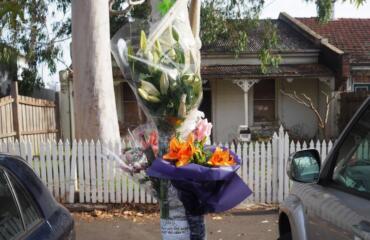Having surfed Victoria’s rugged south-west coastline for more than forty years, Peter Fillmore has learned to respect the power of a heavy Bass Strait swell.
But in recent years, he has witnessed the alarming transformation of the coastline around his hometown of Apollo Bay, a favourite destination of Victorian holidaymakers and a popular stopover for international tourists travelling the Great Ocean Road.
“Being a surfer and interested in the environment, I can see a lot of the beaches just have way less sand on them than what they used to.”

“We’re getting water coming across the Great Ocean Road at least once a year in up to four different places,” says Peter Fillmore, Apollo Bay resident, surfer and activist. “It’s pretty obvious that something needs to be done and what needs to be done is stop burning fossil fuels – including gas.”
Erosion is fast becoming an existential issue for coastal communities like Apollo Bay, with experts warning utilities along the Great Ocean Road and the road pavement itself could be “compromised” within five years.
Located on the edge of the Otway basin, one of Victoria’s richest oil and gas reservoirs, Mr Fillmore describes Apollo Bay as “one of the front lines of climate change in Australia”.
Most of the gas extracted from the basin has come from offshore production wells, but the debate about fossil fuel production in Victoria is set to reignite on land with the state government’s moratorium on onshore conventional gas exploration ending today, July 1.
The Victorian Government announced it was lifting the ban early last year after a three-year investigation by the Victorian Gas Program (VGP) found that restarting the state’s onshore conventional gas industry would contribute only 0.1 to 0.3 per cent to Victoria’s annual carbon emissions and generate up to $300 million a year for regional economies.
The director of the Victorian Geological Survey, Paul McDonald, argues gas will “continue to play a role in supporting Victoria’s transition to a cleaner energy future”.
But analysts and environmentalists have questioned the modelling in the report and the Andrews government’s commitment to its own target of net zero emissions by 2050.
An analysis from The Australia Institute claims the investigation ignored up to 88 per cent of the greenhouse emissions from extracting Victoria’s onshore gas. Analysts Mark Ogge and Tom Swann were critical of the surveyor’s decision to ignore actual emissions from burning the gas, which they say could be up to 46 million tonnes of CO2.
Friends of the Earth’s Cam Walker says using gas as a transition fuel “probably made sense in the ’90s” but has been surpassed by advances in renewables and battery technology. Lifting the moratorium is “inconsistent” with the state government’s own targets for reducing carbon emissions, he argues.
“If they have a commitment to reduce their emissions by 45 to 50 per cent by 2030, then why would you be creating new sources of emissions?”
Mr Walker also questioned a CSIRO survey cited in the VGP report which found that 80 per cent of people in south-west Victoria and Gippsland would either support or tolerate new gas projects in their community.
Peter Fillmore is similarly doubtful, and says “most people” around Apollo Bay would oppose new gas developments in the area.
“[Here] you’re completely surrounded by National Park, you have to drive through a national park to get to Apollo Bay, and over the years it’s attracted people that love the natural environment.”
Recent anti-gas campaigns have been successful in south-west Victoria, with the ‘Lock the Gate’ campaign influencing the Victorian government’s decision to permanently ban unconventional gas extraction, including fracking and coal seam gas.
Lisa Deppeler from the Otway Climate Emergency Action Network (OCEAN) says any new gas projects in the area would again face “huge opposition” because the community is more aware of carbon and methane emissions and the state’s commitment to net zero emissions by 2050.
“I don’t think the people in the Otways are going to let this happen,” she says.
But companies are already making plans to exploit Victoria’s onshore gas resources.
On the other side of the Great Otway National Park, Melbourne-based oil and gas exploration company Lakes Oil plans to drill a gas well close to the existing Otway Gas Plant, which processes gas extracted offshore.
Shareholder announcements reveal the company also has a proposed well in Gippsland which “can be brought online quickly” after July 1.
In 2018 the company unsuccessfully pursued Supreme Court action against the government’s moratorium. Company chairman Richard Ash declined to comment.
Tony Wood, program director for energy and climate change at the Grattan Institute, says lifting the moratorium will help secure some gas supply in the short term as Victorian households transition away from gas, but is sceptical of the state government and industry’s claims it will address a predicted gas shortage and rising gas prices in the state.
“If there were heaps of gas easily available, this gas would have been developed probably before the offshore gas development.”
While climbing gas prices will provide added incentive for companies to pursue onshore gas reserves, there is no guarantee of future demand.
“For most Victorians, an all-electric home would actually be cheaper than electricity and gas,” Mr Wood says.
And with cheap gas prices a “thing of the past for the entire east coast” of Australia, Mr Wood is critical of the Federal Government’s ‘gas-fired recovery’.
“That cheap gas has been exhausted, almost certainly, because if there was more, we would have found it a long time ago,” he says. “And secondly, because gas is a fossil fuel, we’re going to have to stop burning it.”
The effects of climate change are already being experienced by coastal communities in Australia and will only get worse under a ‘business as usual’ emissions scenario, according to CSIRO principal climate research scientist, Dr Kathleen McInnes.
A combination of climate-driven changes to sea level, tides and wind-waves tell “not a good story for erosion” on Australia’s coast, she says.
“It’s those waves sitting on top of the storm surge and any sea level rise that’s going to deliver the energy that’s going to erode our coasts.”
Mr Fillmore says communities along the Great Ocean Road like his cannot wait for an ‘orderly’ transition away from fossil fuels.
“We’re getting water coming across the Great Ocean Road at least once a year in up to four different places,” he says. “That might have happened every 20 or 30 years but now it’s happening every year.
“It’s pretty obvious that something needs to be done and what needs to be done is stop burning fossil fuels – including gas.”
This story is co-published by Crikey.com




